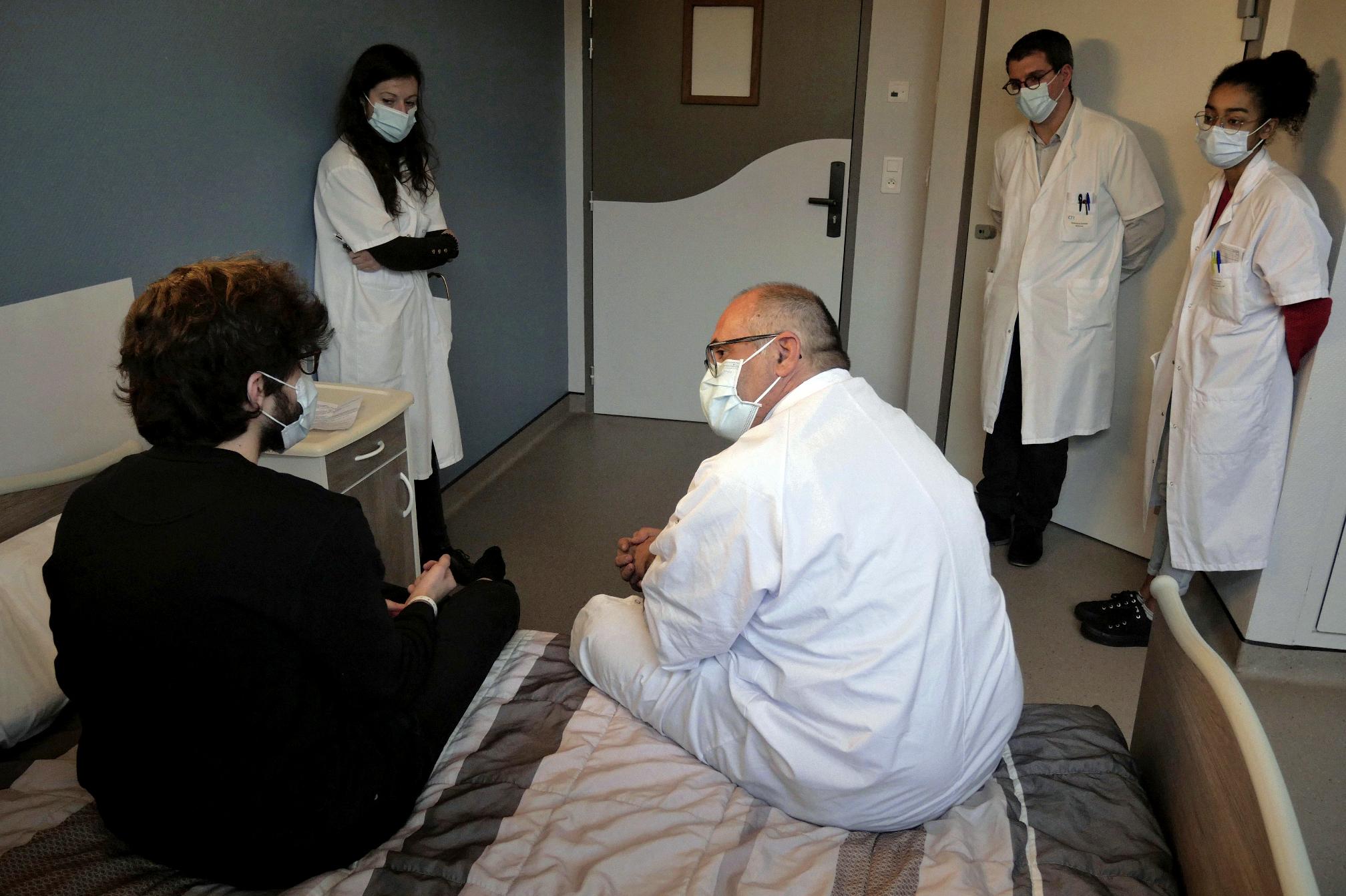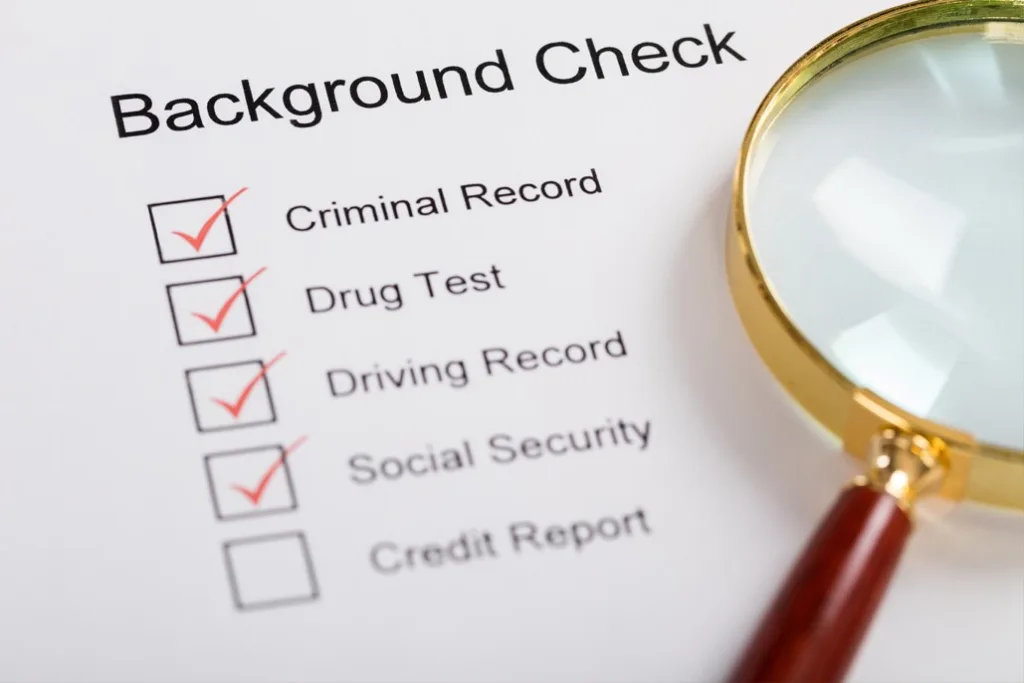Mental health is a crucial aspect of our overall well-being, and sometimes, we may require professional help to deal with mental health issues. In severe cases, hospitalization may be necessary to ensure proper treatment and care. However, many individuals may wonder if a mental hospital stay will show up on their background checks, especially if they are applying for jobs or seeking security clearance.
Firstly, it is important to understand that mental hospital stays are protected by patient confidentiality laws. This means that health care providers cannt disclose a patient’s mental health information without their consent, except in specific situations when it is mandated by law, such as in cases of harm to self or others.
If you have been hospitalized for a mental health condition and are concerned about it showing up on a background check, it is essential to know that it will not appear on a standard criminal background check. This is because mental health records are considered private medical information and are protected under federal and state laws, including the Health Insurance Portability and Accountability Act (HIPAA).
However, in some circumstances, mental health records may be disclosed. For example, if you are applying for a job that requires security clearance, you may be asked to disclose any hospitalizations or treatment for mental health conditions. This is because individuals with untreated or unmanaged mental health conditions may pose a higher risk to national security.
Similarly, if you are applying for a job that involves working with vulnerable populations, such as children, the elderly, or individuals with disabilities, you may be required to undergo a more comprehensive background check, which may include a search for sex offender registries and any history of hospitalization or treatment for mental health conditions.
It is also worth noting that some states have laws that require mental health professionals to report certain information, such as threats of violence or harm to others, to law enforcement agencies. In such cases, the information may show up on a background check if it has been reported to the authorities.
Mental hospital stays will not show up on a standard criminal background check. However, in certain circumstances, such as applying for security clearance or working with vulnerable populations, you may be required to disclose any hospitalizations or treatment for mental health conditions. It is essential to know your rights and the laws surrounding the disclosure of mental health information to protect your privacy and ensure fair treatment.
What Information Is Included in a Medical Background Check?
A medical background check typically includes a few different components. Firstly, there will be a criminal background check, which will look at both state and federal levels to ensure that the candidate does not have any convictions that would disqualify them from working in the medical field. This includes any violent or drug-related offenses.
In addition to the criminal check, a medical background check will also typically include a drug test. This is to ensure that the candidate does not have any substance abuse issues that could affect their ability to perform their job safely and effectively.
Another important component of a medical background check is employment verification. This ensures that the candidate has the necessary education and experience to perform the job they are applying for. It also helps to confirm that the candidate is truthful abut their work history.
Finally, a medical background check should also include a sex offender search. This is especially important if the candidate will be working with children or vulnerable populations. This search helps to ensure that the candidate does not have a history of sexual offenses that could put patients at risk.
Overall, a medical background check is a thorough process that is designed to ensure the safety and well-being of patients. It includes criminal and drug checks, employment verification, and a sex offender search to provide a comprehensive picture of a candidate’s background.

Source: en.wikipedia.org
Can You Join the Military After Visiting a Mental Hospital?
The answer to whether or not you can join the military if you’ve been to a mental hospital is dependent on sveral factors. For depressive disorders such as major depressive disorder, or anxiety disorders such as panic disorder, an individual may be disqualified from service if they’ve completed more than 12 months of outpatient treatment or any duration of inpatient treatment. Additionally, if an individual has a history of self-harm or suicidal ideation, they may also be disqualified from service.
It’s important to note that each branch of the military has its own specific guidelines and policies regarding mental health history, and these may vary. It’s recommended that anyone with a history of mental health treatment speak with a recruiter or medical professional to determine their eligibility for service.
Furthermore, it’s important to disclose any mental health history during the enlistment process, as failure to do so can result in disciplinary action. Additionally, any mental health issues that arise during service must also be reported and treated appropriately.
Overall, while a history of mental health treatment may impact an individual’s eligibility for military service, it’s best to speak with a professional to determine the specific requirements and guidelines for each branch.
Can a Mental Health Diagnosis Be Used Against an Individual?
No, a mental health diagnosis cannot be used against you by an employer or anyone else. The Americans with Disabilities Act (ADA) prohibits discrimination against individuals with disabilities, including mental health conditions. This means that employers cannot use your mental health diagnosis as a basis for making employment decisions, such as hiring, firing, promotions, or job assignments. Employers also cannot ask you about your mental health condition during the hiring process or require you to disclose your condition unless it directly impacts your ability to perform the job duties. Additionally, employers are required to provide reasonable accommodations to individuals with disabilities, which may include accommodations for mental health conditions. It is important to note that if you believe you have experienced discrimination based on your mental health diagnosis, you have the riht to file a complaint with the Equal Employment Opportunity Commission (EEOC).
Will a 5150 Appear on a Background Check?
A 5150 hold, also kown as an involuntary psychiatric hold, is not considered an arrest and therefore should not appear on a criminal record background check. This information is protected by an individual’s right to privacy under Cal. Welf. & Inst. Code section 5328. However, it is important to note that certain government agencies, such as law enforcement, may have access to this information for specific purposes related to public safety or the individual’s mental health treatment. Additionally, private employers may not have access to this information unless it is related to a job that requires a mental health evaluation, such as a job in law enforcement or healthcare.
What Is Included in a Background Check?
When conducting a background check, an employer will typically look at a variety of information related to the candidate’s background. This may include their work history, which can verify their previous employment and ensure that the candidate has the necessary experience for the job. Credit checks may also be conducted to determine the candidate’s financial responsibility and history of making payments on time. Driving records are often reviewed to ensure that the candidate has a valid driver’s license and a safe driving record if the job involves driving. Criminal records are also commonly checked to ensure that the candidate does not have a history of criminal activity that coud pose a risk to the company or its employees. Other information that may be reviewed during a background check includes vehicle registration, court records, compensation, bankruptcy, medical records, references, property ownership, drug test results, military records, and sex offender information. By reviewing this information, an employer can gain a more complete understanding of a candidate’s background and make an informed decision about their suitability for the job.

Mental Health Issues That May Prevent Joining the Military
There are various mental health issues that could disqualify an individual from joining the military. Conditions such as major depression, bipolar disorder, schizophrenia, and anxiety disorders can all potentially prevent somone from enlisting. Additionally, personality and behavioral disorders such as disturbances of conduct, impulse control disorder, oppositional defiant disorder, or other personality or behavior disorders characterized by frequent encounters with law enforcement agencies, and antisocial attitudes or behavior are also grounds for disqualification from service. The military places a strong emphasis on mental and physical fitness, and as such, individuals with certain mental health conditions may not meet the necessary criteria for military service. It is important to note, however, that each case is evaluated on an individual basis, and a qualified mental health professional will assess an individual’s medical history and current condition to determine if they meet the necessary criteria for military service.
Honorable Discharge and Mental Health
Mental health issues are evaluated differently in the military compared to physical health issues. While some mental health disorders may be grounds for medical discharge or retirement, it is not necessarily considered an honorable discharge. The type of discharge ofen depends on the circumstances surrounding the mental health condition and how it affects the individual’s ability to perform their duties. If the condition is deemed service-connected or incurred in the line of duty, the individual may be eligible for medical retirement, which is typically an honorable discharge. However, if the condition is not service-connected or if the individual is found to be malingering or fabricating their symptoms, they may receive a less than honorable discharge. Ultimately, the determination of discharge type for military members with mental health conditions is made on a case-by-case basis by their commanding officer and medical professionals.
What Not to Say in Mental Health Conversations
When discussing mental health, it is important to be mindful of the language you use. Avoid using words that label others, such as “crazy” or “psycho,” as they can be stigmatizing and hurtful. Additionally, do not speculate about whether someone has a mental health disorder or what their diagnosis might be. This can be invasive and cuse unnecessary stress for the individual. It is also important to avoid making assumptions about someone’s experience or telling them to “just get over it” or “cheer up.” These types of statements can be dismissive and invalidating. Instead, it is helpful to listen actively, offer support, and encourage the individual to seek professional help if necessary. Overall, it is important to approach mental health conversations with empathy, openness, and a non-judgmental attitude.
Disclosing a Mental Health Diagnosis to Employers
No, you are not required to disclose any mental health diagnosis to your employer. The decision to share this inforation is entirely up to you. However, if you require accommodations or adjustments to be made in the workplace to support your mental health needs, it may be beneficial to disclose your diagnosis to your employer. The Americans with Disabilities Act (ADA) prohibits discrimination against individuals with disabilities, including mental health conditions, and requires employers to provide reasonable accommodations to qualified employees. It is important to note that employers cannot ask about your mental health status during the hiring process, as this is considered a violation of the ADA. Ultimately, the decision to disclose your mental health diagnosis should be based on your personal comfort level and the specific circumstances of your workplace.

Source: timesofisrael.com
Disclosing Mental Illness: Is It Necessary?
You are not legally required to disclose a mental illness to your employer uness it is a disability under the Equality Act and you require reasonable adjustments to be made. However, it may be beneficial to disclose your condition to your employer as it can help them to support you better in the workplace. This can include making reasonable adjustments such as flexible working hours or providing additional support. It is important to note that if you do disclose your mental illness, your employer has a duty to keep this information confidential and not discriminate against you because of it. Ultimately, the decision to disclose your mental illness is a personal one and should be based on what you feel comfortable with and what will help you to manage your mental health at work.
Can I Purchase a Firearm Following a 5150?
Under California law, if a person is detained on a 5150 hold and is officially admitted to a designated inpatient facility for danger to self (DTS) or danger to others (DTO), they are prohibited from purchasing or owning a firearm for the next five years. This is due to the fact that being detained under a 5150 hold indicates a mental health crisis and the safety of the individual and others may be at risk. The five-year prohibition is in place to allow sufficient time for the individual to receive treatment and ensure that they are stable bfore being allowed to possess a firearm. It’s important to note that violating this prohibition can result in serious legal consequences. Therefore, if you have been detained on a 5150 hold and admitted to a designated inpatient facility for DTS or DTO, it is not legal for you to purchase or own a firearm for the next five years.
The Impact of a 5150 on One’s Life
If you are placed on a 5150 hold, it can have a significant impact on your life. First and foremost, you will be involuntarily detained in a psychiatric hospital for up to 72 hours. During this time, you will not be able to leave the hospital without permission from a mental health professional. This can disrupt your daily routine and obligations, such as work, school, or caring for family members.
Additionally, being on a 5150 hold can have social and emotional consequences. It can be a stigmatizing experience and may cause feelings of shame or embarrassment. It may also impact your relationships with friends and family, as they may not fully understand the reasons for the hold or the implications it has on your life.
After the 72-hour hold is up, the mental health professional may decide to extend the hold for up to 14 days if they believe it’s necessry for your safety or the safety of others. If this happens, you will continue to be involuntarily detained in the psychiatric hospital, which can further disrupt your life and responsibilities.
Overall, being on a 5150 hold can be a challenging and stressful experience, and it’s important to seek support and resources to help you navigate this difficult time.
What Information Does an Employment Background Check Reveal?
An employment background check is a process that employers use to verify the accuracy of the information provided by job candidates. The main purpose of a background check is to confirm the identity and work history of a candidate, as well as to check for any criminal history, financial issues, or othr potential risks that could impact job performance or pose a threat to the company.
Typically, an employment background check will include a review of your employment history, education, and professional references. It may also involve a check of your credit history, criminal record, and driving record, depending on the position and industry.
Overall, the information provided in a background check can vary depending on the employer and the position being applied for. However, candidates should be aware that any discrepancies or negative information discovered during the background check process could potentially impact their chances of being hired. Therefore, it’s important to be honest and transparent when filling out job applications and provide accurate information, as well as to be aware of any potential issues that may arise during the background check process.

Conclusion
In conclusion, mental hospital stays can have significant implications on an individual’s life, epecially when it comes to employment opportunities. While a 5150 hold may not appear on a criminal record background check, employers may still inquire about mental health history during the hiring process. It is important to note, however, that it is illegal for employers to discriminate against individuals with mental health conditions. Additionally, individuals who have completed more than 12 months of outpatient treatment or any duration of inpatient treatment for depressive or anxiety disorders may be disqualified from joining the military. It is crucial to understand and address mental health concerns, but it is equally important to ensure that individuals are not unfairly discriminated against in their personal and professional lives.
